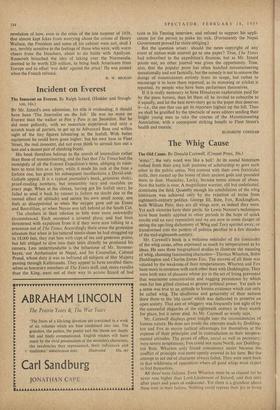Incident on Everest
BY Mr. Izzard's own admission, his title is misleading; it should have been The Journalist on the Job.' He was no more on Everest than the walker at Pen y Pass is on Snowdon. But he did most gallantly, with no mountain experience and only a scratch team of porters, to get up to Advanced Base and within sight of the tiny figures labouring in the Icefall. With better equipment he could have gone higher, but his own base in Fleet Street, the real innocent, did not even think to airmail him out a tent and a decent pair of climbing boots.
His book therefore belongs to the annals of journalism rather than those of mountaineering, and the fact that The Times had the monopoly of all the Everest Expedition's news, obliging its mem- bers to treat him as a leper, while it made his task at the time a forlorn one, has given his subsequent recollections a David-and- Goliath appeal. It is a typical journalist's book, grammar shaky, proof-reading nowhere, but irresistibly racy and readable on every page. When at the climax, having got his Icefall story, he failed to send it back by runner (a failure no doubt due to the mental effect of altitude) and secure his own small scoop, one feels as disappointed as when the oxygen gave out on Evans and Bourdillon, or when Noyce was left behind at the South Col.
The climbers in their relation to him were most awkwardly circumstanced. Each occupied a coveted place, and had been threatened with expulsion from it if they were seen talking to a pressman not of The Times. Accordingly there arose the grotesque situation that when in his tattered tennis-shoes he had struggled up to 18,000 feet. they met him with cups of tea and generous praise, but felt obliged to dive into their tents directly he produced his camera. Less understandable is the behaviour of Mr. Summer- hayes, our Ambassador in Nepal, and his Counsellor, Colonel Proud, whose duty it was to befriend all subjects of Her Majesty passing through Kathmandu. They appear to have enrolled them- selves as honorary members of The Times staff, and, more royalist than the King, went out of their way to accuse Izzard of bad
taste in his Tensing interview, and refused to support his appli- cation for the permit to make his trek. (Fortunately the Nepal Government proved far more obliging.)
But the question arises: should the news copyright of any event of nation-wide interest go to one paper? True, The Times had subscribed to the expedition's finances, but as Mr. Izzard points out, no other journal was given the opportunity. True, also, that the popular press has often handled mountaineering sensationally and not factually, but the remedy is not to remove the doings of mountaineers entirely from its scope, but rather to encourage it to have them reported, as its motoring or cricket is reported, by people who have been performers themselves.
If it is really necessary to have Himalayan exploration paid for by the press barons, then let them all be invited to subscribe to it equally, and let the best news-story go to the paper that deserves it—i.e., the one that can get its reporters highest up the hill. Then we shall be gratified by the spectacle of news editors sending their bright young men to take the courses of the Mountaineering Association, with a consequent striking benefit to Fleet Street's health and morale.
ELIZABETH COXHEAD










































 Previous page
Previous page